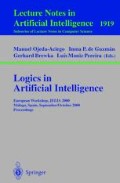Abstract
This paper proposes a formal framework for argumentative dialogue systems with the possibility of counterargument. The framework allows for claiming, challenging, retracting and conceding propositions. It also allows for exchanging arguments and counterarguments for propo-sitions, by incorporating argument games for nonmonotonic logics. A key element of the framework is a precise definition of the notion of relevance of a move, which enables flexible yet well-behaved protocols.
Access this chapter
Tax calculation will be finalised at checkout
Purchases are for personal use only
Preview
Unable to display preview. Download preview PDF.
References
L. Amgoud, N. Maudet, and S. Parsons. Modelling dialogues using argumentation.In Proceedings of the Fourt International Conference on MultiAgent SystemsBoston, MA, 2000.
T.J.M. Bench-Capon, D. Lowes, and A.M. McEnery. Using Toulmin’s argument schema to explain logic programs. Knowledge Based Systems, pages 177–183, 1991.
G. Brewka. Dynamic argument systems: a formal model of argumentation pro-cesses based on situation calculus. Journal of Logic and Computation, 2000. To appear.
T.F. Gordon. The Pleadings Game.An Artificial Intelligence Model of Procedural Justice. Kluwer Academic Publishers, Dordrecht/Boston/London, 1995.
F. Grasso, A. Cawsey, and R. Jones. Dialectical argumentation to solve conflicts in advice giving: a case study in the promotion of healthy nutrition. International Journal of Human-Computer Studies 2000. To appear.
J.C. Hage, R.E. Leenes, and A.R. Lodder. Hard cases: a procedural approach.Artificial Intelligence and Law2:113–166, 1999
R.P. Loui. Process and policy: resource-bounded non-demonstrative reasoning. Computational Intelligence, 14:1–38, 1998.
J.D. MacKenzie. Question-begging in non-cumulative systems. Journal of Philo-sophical Logic, 8:117–133, 1979.
N. Maudet and D. Moore. Dialogue games for computer-supported collaborative argumentation. In Proceedings of t e Works op on Computer-Supported Col labo-rative Argumentation for Learning Communities, Stanford, 1999.
S. Parsons, C. Sierra, and N.R. Jennings. Agents that reason and negotiate by arguing. Journal of Logic and Computation, 8:261–292, 1998.
H. Praken. Relating protocols for dynamic dispute with logics for defeasible argumentation. Synthese, 2000. To appear in special issue on New Perpective in Dialogical Logics.
H. Prakken and G.A.W. Vreeswijk. Logical systems for defeasible argumenta-tion. In D. Gabbay, editor, Handbook of Philosophical Logic. Kluwer Academic Publishers, Dordrecht/Boston/London, 2000. Second edition, to appear.
G.A.W. Vreeswijk. The computational value of debate in defeasible reasoning. Argumentation, 9:305–341, 1995.
D.N. Walton and E.C.W. Krabbe. Commitment in Dialogue.Basic Concepts of Interpersonal Reasoning. State University of New York Press, Albany, NY, 1995.
Author information
Authors and Affiliations
Editor information
Editors and Affiliations
Rights and permissions
Copyright information
© 2000 Springer-Verlag Berlin Heidelberg
About this paper
Cite this paper
Prakken, H. (2000). On Dialogue Systems with Speech Acts, Arguments, and Counterarguments. In: Ojeda-Aciego, M., de Guzmán, I.P., Brewka, G., Moniz Pereira, L. (eds) Logics in Artificial Intelligence. JELIA 2000. Lecture Notes in Computer Science(), vol 1919. Springer, Berlin, Heidelberg. https://doi.org/10.1007/3-540-40006-0_16
Download citation
DOI: https://doi.org/10.1007/3-540-40006-0_16
Published:
Publisher Name: Springer, Berlin, Heidelberg
Print ISBN: 978-3-540-41131-4
Online ISBN: 978-3-540-40006-6
eBook Packages: Springer Book Archive

